人教版七年级下册英语第四单元课件
合集下载
2019人教版七年级英语下册Unit4_Don't_eat_in_class课件PPT(年春)教育物理

Don’t talk in class.
Don’t talk with each other in class. Stop talking in class.
Don’t play cards in school.
Don’t smoke .It’s bad for your health.
Don’t sleep in class.
Don’t fight. We can’t fight with others.
Grammar
1. 祈使句是表示请求、命令、叮嘱、号召、 劝告等的句子; 通常省略主语you; 句中谓语 动词用动词原形; 句尾一般用降调; 祈使句的
开头是动词原形。
祈使句有肯定和否定两种: e.g. Look out! 小心!
Don’t wear hats in class. Don’t dance in the classroom.
Wear a uniform.
Don’t listen to music in the classroom.
Listen to music in the music room.
Homework
Can we eat in class? No, we can’t.
Don’t eat in the classroom.
arrive late for class Can we arrive late for class? No, we can’t.
Don’t arrive late for class.
• Think about the family rules.
FAMILY RULES
Don’t talk loudly on the phone.
unit 4【复习课件】七年级英语下册单元复习(人教版)

别把脏碗留在厨房里!
10. I can’t relax on weekends __e_it_h_e_r___ _b_e_c_a_u_se___ I have to
learn to play the piano. 周末我也不能放松, 因为我不得不去学习弹钢琴。
重点语法
祈使句
用于表达命令、请求、劝告、警告、禁止等的句子称为 祈使句。祈使句最常用于表达命令。祈使句因对象(即主语) 是第二人称, 所以通常省略主语而以动词原形开头。祈使句句 末使用句号或感叹号。为表示语气委婉, 可在句首或句尾加 please, please放在句尾时, 前面通常加逗号。
Let me help you. 让我来帮你。
重点语法
祈使句
考题:[ 广元] —________ silent, please! You are in the library.
—I’m sorry, madam.
A. Keep
B. To keep
C. Keeping
D. Kept
重点语法
祈使句
否定祈使句的形式:
重点单词
1. rule n. 规则; 规章→____s_c_h_o_o_l_r_u_le_s___学校规则 2. arrive v. 到达→ ___a_r_r_iv_e__in_/_a_t._..__到达……
→ar_r_i_v_e_l_a_te__fo_r__sc_h上oo学l 迟到 3. fight v.& n. 打架; 战斗→ __f_ig_h__t _a_g_a_in_s_t_s_b_.和某人打斗→
→_____fo_l_lo_w__in_g____n. 下列事物
重点单词
30. learn v. 学习; 学会→ _le_a_r_n__to__d_o_s_t_h_.____学习做某事 → ____l_ea_r_n__fr_o_m__s_b_.向某人学习 → ____l_e_a_rn__a_b_o_u_t了解; 获悉
10. I can’t relax on weekends __e_it_h_e_r___ _b_e_c_a_u_se___ I have to
learn to play the piano. 周末我也不能放松, 因为我不得不去学习弹钢琴。
重点语法
祈使句
用于表达命令、请求、劝告、警告、禁止等的句子称为 祈使句。祈使句最常用于表达命令。祈使句因对象(即主语) 是第二人称, 所以通常省略主语而以动词原形开头。祈使句句 末使用句号或感叹号。为表示语气委婉, 可在句首或句尾加 please, please放在句尾时, 前面通常加逗号。
Let me help you. 让我来帮你。
重点语法
祈使句
考题:[ 广元] —________ silent, please! You are in the library.
—I’m sorry, madam.
A. Keep
B. To keep
C. Keeping
D. Kept
重点语法
祈使句
否定祈使句的形式:
重点单词
1. rule n. 规则; 规章→____s_c_h_o_o_l_r_u_le_s___学校规则 2. arrive v. 到达→ ___a_r_r_iv_e__in_/_a_t._..__到达……
→ar_r_i_v_e_l_a_te__fo_r__sc_h上oo学l 迟到 3. fight v.& n. 打架; 战斗→ __f_ig_h__t _a_g_a_in_s_t_s_b_.和某人打斗→
→_____fo_l_lo_w__in_g____n. 下列事物
重点单词
30. learn v. 学习; 学会→ _le_a_r_n__to__d_o_s_t_h_.____学习做某事 → ____l_ea_r_n__fr_o_m__s_b_.向某人学习 → ____l_e_a_rn__a_b_o_u_t了解; 获悉
人教版英语七年级下册Unit4PPT课件
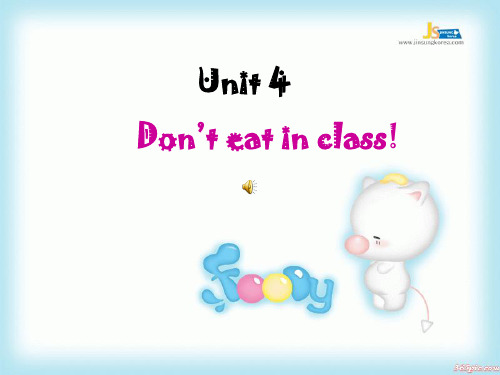
3:remember doing sth记得做过某事(做了)
如: I remember taking a desk to Tom
我记得已经拿给Tom了(已经做过了)
Do you remember __jion my party tomorrow,Alice
I can remember __your party last month.
3: learn from 向。。。学习
如:You should learn from Bob
你应该向Bob学习
4:learn about 学习什么 ,了解什么
如:I want to learn about history
2021/7/23
33
1. have fun玩的开心--have great fun玩的很开心 如:We always have great fun at parties 我们在聚会上总是玩的很开心
2.feel系动词----感受,觉得
feel sb do sth 感到某人做某事}这件事情已经发 生了
feel sth do sth感到某物做某事}这件事情已经发 生了
如:I felt a cat eat my food.(食物已经被吃了)
2021/7/23
25
1. feel sb/sth doing sth感到某人/某物正在做某 事(现在正在做的事情)
:
2:lucky(形容词)幸运的 You are lucky你是幸运的
3:unlucky(形容词)不幸运的
2021/7/23
30
1. keep (v) 使....保持
keep sb /sth +形容词/介词短语
表示:某人或某物保持某个状态
人教版七年级下册英语 Unit 4 单元全套重点习题练习课件
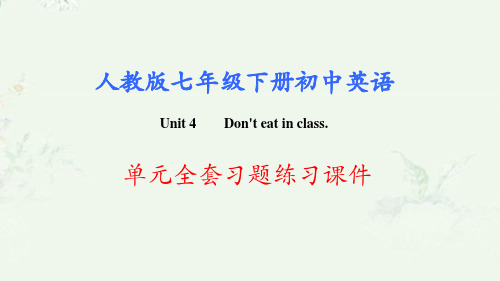
school uniform?
A: ___E___23 B:Yes, we have to wear our
school uniforms on school days. We also have to wear sports shoes in P. E. class.
A. What are the rules? B. Do you like your new school? C. We can't do it in the hallways
B. Do you like your new school?
B:No, we can't. __C___24 C. We can't do it in the hallways
A:What else (其他的)?
either. D. What do you think of your
B:We have to be quiet in the new school?
school uniform?
Unit 4 Don't eat in class.
课时2 Section A (Grammar Focus-3c)
一、用所给词的适当形式填空。 1. __D__o_n_'t__b_e__ (not be) late for class. 2. He ___h_a_s____ (have) to read English every morning. 3. Do you have __t_o_w__ea_r___ (wear) school uniforms every day? 4. Tony _d_o_e_s_n_'_t _h_a_v_e_ (not have) to take a shower every day. 5. Please ___b_e____ (be) quick. It's time for class.
A: ___E___23 B:Yes, we have to wear our
school uniforms on school days. We also have to wear sports shoes in P. E. class.
A. What are the rules? B. Do you like your new school? C. We can't do it in the hallways
B. Do you like your new school?
B:No, we can't. __C___24 C. We can't do it in the hallways
A:What else (其他的)?
either. D. What do you think of your
B:We have to be quiet in the new school?
school uniform?
Unit 4 Don't eat in class.
课时2 Section A (Grammar Focus-3c)
一、用所给词的适当形式填空。 1. __D__o_n_'t__b_e__ (not be) late for class. 2. He ___h_a_s____ (have) to read English every morning. 3. Do you have __t_o_w__ea_r___ (wear) school uniforms every day? 4. Tony _d_o_e_s_n_'_t _h_a_v_e_ (not have) to take a shower every day. 5. Please ___b_e____ (be) quick. It's time for class.
Unit 4 第4课时(Section B 1a-1d) (课件)七年级英语下册(人教版)
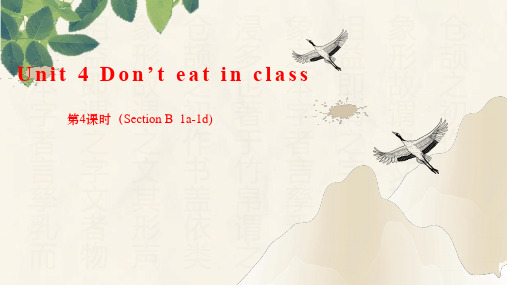
1d Talk about the rules in Dave’s house.
He can’t go out on school nights.
He can’t watch TV in the evening.
1d Talk about the rules in Dave’s house.
He can’t see his friends on school days.
does his homework
Look and say
What does he often do?
practices the guitar
Look and say
What does he often do?
does the dishes
Look and say
What does he often do?
பைடு நூலகம்
every Saturday on school days every morning
before dinner after dinner
1c
Listen again. Write when Dave has to follow the rules in the chart in 1b. Choose from the phrases in the box.
Emily : Hi, Dave. Do you _w_a_n_t_t_o_w__a_tc_h__th_e__b_a_sk_e_t_b_a_ll_g_a_m__e_in the park this evening? Dave: I’d love to, but I can’ t go out_o_n_s_c_h_o_o_l_n_i_g_h_ts__. Emily: Oh, that’s too bad. Dave: Yeah, I have s_o__m_a_n_y__ru_l_e_s... Emily: Really? Dave: Yeah, I can’t __se_e__m_y__fr_i_e_n_d_s_o_n_s_c_h_o_o_l_d_a_y_s_and I have to do my homework after school.
人教版英语七年级下册 Unit 4 单元巩固与复习 课件(共25张PPT)

6. 我不得不留短发。 I have to keep my hair short.
句型分析 1. Don’t arrive late for class. 1)这是一个表示否定的祈使句,祈使句表示请求、命令或者建议。 谓语动词用原形,句子的主语you通常省略。 句子结尾用句号,表示强烈语气的时候用感叹号, 朗读时要用降调。 可以在句末或者句首加上please, 使语气更加的缓和客气。 please 放在句首时后面不需要加逗号,放在句末时后面要加逗号。 例如:Listen to your teacher, please. 请听你的老师讲话。
Clark [kla:k]克拉克(姓;男名) Amy [eɪmɪ]埃米(女名) Molly['mɒlɪ]莫莉(女名) New York [nju: jɔ:k]纽约 arrive [ə'raɪv]v.到达 wear [weə]v.穿;戴 bring [brɪŋ]v.带来;取来 listen ['lɪs(ə)n]v.听;倾听 relax [rɪ'læks]v.放松;休息
have to 不得不have to 得不be quiet 安静
be quiet 安静
make breakfast 做早饭 make breakfast 做早饭
be noisy 吵闹
be noisy 吵闹
keep one’s hair short 留短ke发ep one’s hair short 留 play with sb. 和某人一起短玩发 play the piano 弹钢琴 play with sb. 和某人一
Don’t look out of the window. 不要向窗外看。 Please come in. = Come in, please. 请进。
句型分析 1. Don’t arrive late for class. 1)这是一个表示否定的祈使句,祈使句表示请求、命令或者建议。 谓语动词用原形,句子的主语you通常省略。 句子结尾用句号,表示强烈语气的时候用感叹号, 朗读时要用降调。 可以在句末或者句首加上please, 使语气更加的缓和客气。 please 放在句首时后面不需要加逗号,放在句末时后面要加逗号。 例如:Listen to your teacher, please. 请听你的老师讲话。
Clark [kla:k]克拉克(姓;男名) Amy [eɪmɪ]埃米(女名) Molly['mɒlɪ]莫莉(女名) New York [nju: jɔ:k]纽约 arrive [ə'raɪv]v.到达 wear [weə]v.穿;戴 bring [brɪŋ]v.带来;取来 listen ['lɪs(ə)n]v.听;倾听 relax [rɪ'læks]v.放松;休息
have to 不得不have to 得不be quiet 安静
be quiet 安静
make breakfast 做早饭 make breakfast 做早饭
be noisy 吵闹
be noisy 吵闹
keep one’s hair short 留短ke发ep one’s hair short 留 play with sb. 和某人一起短玩发 play the piano 弹钢琴 play with sb. 和某人一
Don’t look out of the window. 不要向窗外看。 Please come in. = Come in, please. 请进。
人教版七年级英语下册Unit4复习课件

—Do my homework, of course.
A. What
B. When
C. Where D. How
4. —
late for school again.
—Sorry, I won’t.
A. Not be B. Don’t be C. Not D. Don’t
5. Which of the following pictures means“Please be quiet”?
【用法辨析】listen与hear的区别
【活学活用】
Байду номын сангаас
①听! 你能听见汤姆正在唱歌吗?
! Can you
Tom singing now?
②不要在会上听收音机。
Don’t
the radio in the meeting.
答案: ①Listen; hear ②listen to
4. We can’t wear a hat in our school. 在我们学校里不允许戴帽子。 【自主领悟】wear“穿; 戴”, 表示状态。相当于be in。例如: He is wearing a black T-shirt. 他穿着一件黑色的T恤衫。
【归纳拓展】before的其他用法
【活学活用】
①She always says goodbye to her mother before
(go)to school.
②He always washes his feet
he goes to bed.
A. after
B. because
C. if
D. before
his workers and he is
also strict
人教版七年级英语下册教学课件《Unit 4 Section A Grammar Focus-3c》
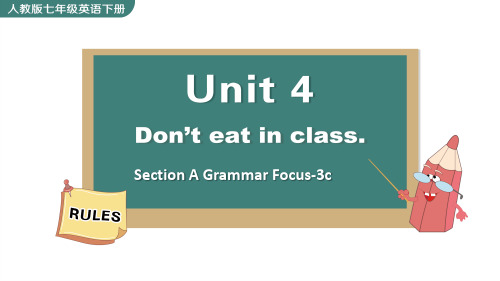
3a Write the rules for the school library.
Library Rules 1. Don’t talk. 2. Don’t eat. 3.Don’t listen to music. 4. Don’t take photos.
Use the words to make questions about 3b the rules. Then write answers according
8. 他在学校里必须穿校服吗? _D_o_e_s__h_e__h_a_v_e__t_o__w__e_a_r__a__u_n_if_o_r_m___a_t__s_c_h_o_o_l?
9. 是的,必须。/ 不,不必。 _Y__e_s_,__h_e__d_o_e_s_.__/__N_o_,__h_e__d_o_e_s_n_’_t_._
We can eat in class. …
We don’t have to wear school uniforms. …
We can listen to music in class. …
We can eat in the classroom. …
We don’t have to do homework. …
(he/have to/in the dining hall)?
A: __Y_e_s_,_h_e__d_o_e_s_._____
Listen to music?
Q: _C_a_n__w__e_l_i_s_te_n__t_o__m__u_s_ic__i_n_t_h_e__h_a_l_l_w_a_y__s? ______________________________________________________ (we/can/in the hallways)?
人教版七年级英语下册unit4课件2
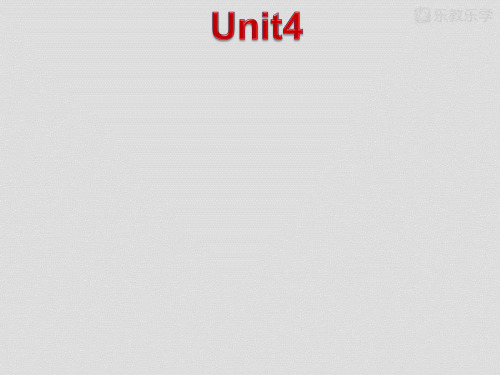
祈使句是表示请求、命令、建议等的句子。 句子中通常不出现主语,谓语动词一律用原 形。根据句子语气的强弱,句末用感叹号或 句号。
一、祈使句的肯定式 1.以行为动词原形开头,简称Do型。 ehere.到这儿来。 2.以动词be开头,简称Be型。 e.g.Bequiet,please.请安静。 3.以Let开头,简称Let型。 e.g.Let’sgo!咱们走吧!
1.根据例句,可知要求我们造一般疑问句 并根据实际情况进行回答。 2.先确定句子的主语。 3.再确定用情态动词还是用助动词来构成
疑问语序。
4.根据实际情况做出肯定或否定回答,答
语的主语要与问句保持一致。
Thenanswerthequestions.
2.Eat?(he/haveto/inthedininghall) Q:________________________________? Doeshehavetoeatinthedininghall A:_____________ Yes,hedoes. 3.Listentomusic?(we/can/inthehallways) Q:________________________________? Canwelistentomusicinthehallways A:_____________ No,wecan’t. 4.Wearahat?(we/can/intheclassroom) Q:_____________________________? Canwewearahatintheclassroom A:____________ No,wecan’t.
3.___________________________________ Don’teatordrinkinthecomputerroom.
人教版七年级英语下册 Unit4总复习课件

can 能,会 (表示能力) —Can you play basketball? —Yes, I can. 你会打篮球吗? 是的, 我会。
have to 必须,不得不 don’t / doesn’t have to 不必
你不必在上午七点前到校。 You don’t have to be school before 7:00.
考点7
祈使句
1.祈使句是表示命令、叮嘱、号召等的句子; 2.通常省略主语you; 3.句中谓语动词用动词原形; 4.祈使句有肯定和否定两种:
否定
Don’t eat in class. Don’t play sports in the classroom. Don’t fight.
肯定
Come in, please! 请进! Sit down, please. 请坐。
违规 break rules
3.考点归纳
考点1
arrive in / at与get to 的区别
① My father arrived in / got to Beijing this morning.
我爸爸今天上午到达了北京。
② The farmer arrived at / got to an old house and knocked at
(be) on time be late for … in class listen to … dining hall eat outside bring … to … have to wear the school uniform go out see friends practice the guitar
26.遵循;跟随v.
follow
27.幸运;运气n.
have to 必须,不得不 don’t / doesn’t have to 不必
你不必在上午七点前到校。 You don’t have to be school before 7:00.
考点7
祈使句
1.祈使句是表示命令、叮嘱、号召等的句子; 2.通常省略主语you; 3.句中谓语动词用动词原形; 4.祈使句有肯定和否定两种:
否定
Don’t eat in class. Don’t play sports in the classroom. Don’t fight.
肯定
Come in, please! 请进! Sit down, please. 请坐。
违规 break rules
3.考点归纳
考点1
arrive in / at与get to 的区别
① My father arrived in / got to Beijing this morning.
我爸爸今天上午到达了北京。
② The farmer arrived at / got to an old house and knocked at
(be) on time be late for … in class listen to … dining hall eat outside bring … to … have to wear the school uniform go out see friends practice the guitar
26.遵循;跟随v.
follow
27.幸运;运气n.
人教版七年级英语下册教学课件《Unit 4 Section A 1a-1c》
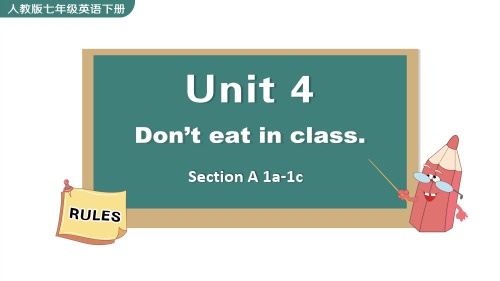
违反规章
school rules 校纪 = the rules of the school class rules 班规 = the rules of the class ※ rule还可以用作动词,意为“统治,支配”。 e.g. The king ruled the country 500 years ago.
2. It’s very hot outside. You __c_a_n__ wear a hat. 3. We _c_a_n_’_t_ eat in the classroom, because it’s
impolite to teachers. 4. I _c_a_n_’_t_ go to bed after 11:00 on school night. 5. The students __c_a_n__ read books and magazines
I never heard such an interesting story. 我从来没听过这么有趣的一个故事。
2) listen“听” 侧重于“听”这一动作。例如: Listen to me carefully. 认真听我说。
Children like to listen to music. 孩子们喜欢听音乐。 3) sound“听起来”,它是系动词,后面接形容词等。 例如: That sounds great. 那听起来真不错。 It sounds like fun. 听起来挺有趣。
2. When do you usually arrive _a_t__ the bus station?
3. Jenny’s uncle usually arrives _in__ Shanghai in the evening.
七年级Unit 4(单元解读课件)-七年级英语下册同步备课系列(人教版)

学习理解 应用实践
学习理解 应用实践
迁移创新
课时内容解读
第四章
PART FOUR
单元内容解读
主题词汇
rule, dish, night, luck, hair, arrive, listen,fight, wear, bring, practice, relax, read,feel, remember, follow, keep, learn, quiet,noisy, dirty, terrible, strict
2d所提供的对话呈现老生与新生谈论关于学校的校 该 语 篇 的 语 词汇:
在看图和
规的对话,包括了上课不迟到,不带吉他去学校,穿 法 功 能 性 比 wear,immportant , 听对话的
校服以及在图书馆保持安静。
较 强 , 能 为 bring ,uniform , 过程中,
grammar focus表格呈现了单元重点语法功能结构, 学 生 学 习 语 quiet
学习理解 应用实践
1. 学生能够用do型祈使句表达规则 2.学生能掌握用can的肯定句,否定句和一般疑问 句表达规则。 3. 学生能学会遵守学校规则
学习理解 应用实践
统筹课时安排
教材板块
课型
第*课时
课时目标
学习层次
第三节 SectionB
1a-1f
第四节 SectionB
2a-2c
第五节 SectionB 3a-self
能简单谈论规章制度
主题群:做人与做事,人际沟通
子主题内容:班级与学校规则,规
则意识
单元内容解读
01 What:该单元语篇内容主要是中学生的学习和生活上的规章制度
Why:引导学生关注规则,养成遵守规则的习惯和意识。训练学生遇到规则问题
人教版七年级英语下册《Unit4 Don't eat in class》课件

spit
School Rules
1. Don’t arrive late for class. 2. Don’t run in the hallways or the classrooms. 3. Don’t eat in the classroom. 4. Don’t listen to music in the
What are the rules at school?
Don’t listen to music Don’t smoke. Don't spit everywhere Don’t fight Don’t draw
in the classrooms.
on the wall
Don’t run in the hallways or the classrooms. Don’t talk in class
classrooms or the hallways. 5. Don’t fight. 6. Don’t play computer games. 7. Don’t talk in class. 8. Don’t draw on the wall. 9. Don’t smoke. 10. Don’t spit everywhere.
15、一年之计,莫如树谷;十年之计,莫如树木;终身之计,莫如树人。2021年7月2021/7/202021/7/202021/7/207/20/2021
16、提出一个问题往往比解决一个更重要。因为解决问题也许仅是一个数学上或实验上的技能而已,而提出新的问题,却需要有创造性的想像力,而且标志着科学的真正进步。2021/7/202021/7/20July 20, 2021
10、阅读一切好书如同和过去最杰出的人谈话。2021/7/202021/7/202021/7/207/20/2021 8:04:50 PM
Unit4 单元知识点总结课件--七年级英语下册(人教版)

school!
No+ 动词-ing 禁止做某事
No smoking.
Let sb not do sth
让…不要做某事
Let them not go.
相关链接: Let’s+动词原形 Vs. Let us+动词原形
Let us+动词原形:通常不包括听话者在内;省略主语you Let us watch TV. (“你让我们”;说话者和听话者不一起)
2.___________exercising, and you’ll be healthier.
A.Keep
B.To keep
3.Jack, ___________here, and I will give you a present.
A.comes
B.come
4. _____ quiet, please. We are in the reading room.
have to
强调客观需要 有人称/时态变化 It’s too late. We have to go home now.
单项选择
1.——Hey, Ted! You ___________never play in the street. It’s not safe.
——Sorry, Mum. I won’t again.
—— OK! I’ll be there soon.
A.fetch
B.take
C.bring
3.It’s cold outside. You should ___________a coat with you.
A.bring
B.take
C.get
4.—— I’m sorry I left my homework at home. Must I go and ___________it?
No+ 动词-ing 禁止做某事
No smoking.
Let sb not do sth
让…不要做某事
Let them not go.
相关链接: Let’s+动词原形 Vs. Let us+动词原形
Let us+动词原形:通常不包括听话者在内;省略主语you Let us watch TV. (“你让我们”;说话者和听话者不一起)
2.___________exercising, and you’ll be healthier.
A.Keep
B.To keep
3.Jack, ___________here, and I will give you a present.
A.comes
B.come
4. _____ quiet, please. We are in the reading room.
have to
强调客观需要 有人称/时态变化 It’s too late. We have to go home now.
单项选择
1.——Hey, Ted! You ___________never play in the street. It’s not safe.
——Sorry, Mum. I won’t again.
—— OK! I’ll be there soon.
A.fetch
B.take
C.bring
3.It’s cold outside. You should ___________a coat with you.
A.bring
B.take
C.get
4.—— I’m sorry I left my homework at home. Must I go and ___________it?
英语单词拆分趣味快速记忆课件ppt人教版七年级下册 Unit4

记忆方法:李四把十个手指放在耳边仔细听。
listen to… 听……
fight [faɪt] v. & n. 打架、战斗 分析:fi(sh)-鱼、ght-桂花糖
记忆方法:打架赢了的鱼将获得桂花糖(奖品)。
sorry [ˈsɒri],[ˈsɑ:ri] adj. 抱歉的、难过的、惋惜的 分析:s-蛇、or-猿人、ry-人鱼
记忆方法:请把脸和耳朵贴在门上学习。
Clark [klɑ:(r)k] 克拉克(姓、男名) Amy [ˈeɪmi] 埃米(女名)
Molly ['mɒli],['mɑ:li] 莫莉(女名)
New York [ˌnju: ˈjɔ:(r)k] 纽约
谢谢观看!
记忆方法:我拿重要的汉堡包给港口的蚂蚁。
bring [brɪŋ] v. 带来、取来 分析:b-笔、ring-戒指
记忆方法:他带来了笔和戒指。
have to 必须、不得不
uniform [ˈju:nɪfɔ:(r)m] n. 校服、制服 分析:un-联合国、i-爱、form-表格
记忆方法:联合国的人爱把表格贴在学生的校服上。
人民教育出版社
七年级下册--Unit 4
rule [ru:l] n. 规则、规章 分析: rul-如来、e-鹅
记忆方法:如来佛祖给鹅制定规则。
arrive [əˈraɪv] v. 到达 分析:ar-矮人、ri-日、v-5、e-鹅
记忆方法:矮人到达日本后,吃了5只鹅。
(be) on time 准时
记忆方法:仆人在一个池塘的冰上做练习。
dish [dɪʃ] n. 碟、盘 分析:di-地、sh-水
记忆方法:地上的盘子有水。
do the dishes 清洗餐具
人教版七年级英语下册Unit 4 Don't eat in class Section A 课件

5. Jack, ________ to be here at 8 o'clock
A. is sure
B. sure
C. be sure
D. are sure
6. ____ go to the store. Let sb. do sth.
A. Let's B. Don't let they C. Let we D. No let me
感叹句:Nice to meet you!
祈使句
祈使句一般用来表示请求、命令、劝说、号召、警告等。 肯定式:(You) + v. +... 否定式:(You) + don't + v. + ...
在祈使句中, 通常省略第二人称主语you。 肯定式以动词原形开头,否定式一般在动词原形前加don't。
Don't _a_r_r_iv_e__/ _b_e_l_a_te__f_o_r (迟到) class.
We can _a_r_ri_v_e_h_o_m__e_ (到家) at 8:00 p.m..
2. They always fight f_o_r_ (介词) money.
fight with sb. 和... 打架;和...共同战斗
2. 不要D在oin晚g s饭po后rts吃is g冰oo激d f凌or。our health.
DonS'hteeias tgoicoed-wcritehacmhildarfetne.r dinner.
3. 对朋ds.
4. 让我帮助你。
Let's me (x)
1c Student A is a new student. Student B tells Student A
- 1、下载文档前请自行甄别文档内容的完整性,平台不提供额外的编辑、内容补充、找答案等附加服务。
- 2、"仅部分预览"的文档,不可在线预览部分如存在完整性等问题,可反馈申请退款(可完整预览的文档不适用该条件!)。
- 3、如文档侵犯您的权益,请联系客服反馈,我们会尽快为您处理(人工客服工作时间:9:00-18:30)。
Practice
根据句意,用can和can’t填空。
1.Mr Green can’t smoke here, because there’s a sign on the wall. It says “No smoking.” 2.It’s very hot outside. You can wear a hat. 3.We can’t eat in the classroom, because it’s impolite to teachers. 4.I can go to bed after 22:00 on weekends. 5.The students can read books and magazines in the library.
重点短语
• • • • • • • • • ……迟到 arrive(be) late for …… 在走廊/餐厅 in the hallway/ dining hall 在教室/音乐教室 in the classroom/ music room 听(音乐) listen to (the music) 外出 go out 清洗餐具 do the dishes 铺床 make one’s bed 与某人打架 fight with sb 戴帽子 wear a hat/wear hats
战斗,
fight with sb.
同某人打架
fight the fire
救火
Explanation fight 是不及物动词,其后加上with才能接 宾语。fight with sb. 意为“与某人打架”。 如: Don’t fight with your sister again. 不要再和你妹妹打架了。 They are fighting with the enemies bravely. 他们正在勇敢地同敌人战斗。
Practice
将下列祈使句改成否定形式。
肯定祈使句 否定祈使句 1. Sit down. Don’t sit down. 2. Come in. Don’t come in. 3. Eat at home. Don’t eat at home. 4. Listen to music outside. Don’t listen to music outside. 5. Do your homework at school. .Don’t do your homework at school.
4.You didn‘t have to wait for me yesterday. 昨天你没有必要等我。
用have to或has to填空 1.We have to clean our classroom after school. 2.She has to make her bed after getting up. 3.It’s late. Mr Beckman has to go to work by car. 4.Emily and Peter join a music club. They have to practice guitar every day.
拓展
祈使句
2.第一、三人称祈使句是以第一人称和第 三人称代词或者名词等作为祈使的对 象,这类祈使句通常以let为引导词表建 议。如: Let’s go! Let us go home! Let him be here by 10 o’clock.
拓展
祈使句
二、祈使句的强调形式及否定形式 1.祈使句的强调形式是在整个结构之前加 do。如: Do give my regards to your parents! 务必/一定代我向你父母问好! 2.祈使句的否定形式是在整个结构之前加 don’t或never。如: Don’t be nervous!你不要紧张!
A:Do you have to wear a uniform? B:Yes ,I do./No,I don’t. have to:不得不,必须
1.I have to get up early on Monday morning.
2.Jim has to help his mother do some cooking. 3.I had to cook for my sister last night.
School Rules
Don’t fight.
School Rules
Don’t talk in class. Don’t talk with each other in class.
School Rules
Don’t sleep in class.
School Rules
Don’t use mobile phone in class.
Notes :
1 arrive in / at + 地点
get to +地点
reach +地点 (到达某地方 )
2 class 班 ,课 在课堂上 上课
in class
have classes
be late for class
上课迟到
• on time 准时 in time 及时 • 他每天准时到校。 • He gets to school on time everyday • 她及时赶到了医院。 • She reach the hospital in time. inside 里面的;在里部的 • be strict with sb. • 他爸爸对他很严格。 • His father is strict with him.
School Rules
Don’t arrive late for class.
School Rules
Don’t run in the hallways.
School Rules
Don’t eat in the classroom.
School Rules
Don’t listen to music in the classrooms or the hallways.
_______ to do theds? Does Mary ________ have 3.They have to get up at 5:30 every morning. (划线部分提问) When do ______ _______ they have to get up? 4. I can see some books on the desk? (改为否定句) any I_______ books on the desk. can’t see _______ 5. How was the weather yesterday?(改为同义词)
have to意为“必须;不得不”,后接动词原 形,有人称、数和时态的变化。 它的第三人称单数形式为has to, 过去式为had to。 含have to, has to, had to的句子需分别借 助助动词do, does, did构成疑问句和否定句。 如: She has to go there by bus. (改为一般疑 问句) → Does she have to go there by bus? They had to get up early. (改为否定句) → They didn’t have to get up early.
Unit 4
Don’t eat in class.
New words
hallway
走廊;过道
New words
classroom
教室
New words
rule
规则
New words
dinning
饭厅;餐厅
New words
fight
打架;争吵
Don’t fight . fight
不要打架. 斗争, 作战
have to的用法
1. have to句式
肯定式: have/has to + 动词原形 We have to leave now. She has to work on Sunday. 否定式: don’t/doesn’t have to + 动词原形 You don’t have to walk. He doesn’t have to buy a new coat. 一般疑问式: Do/Does + 主语 + have to + 动词原形 + …?
拓展
情态动词can的用法
用于疑问句中用来提出要求。例如: Can you...?“请你……好吗?”表示说话 人的请求。 Can I...?“我可以……吗?”用来征求对 方是否允许自己做某事。如在句末加上 please一词就显得更有礼貌了。例如: Can you help me, please? 请你帮助我好吗?
School Rules
Don’t smoke. (No smoking)
We can’t rule the country without rules.
没有规章制度就不能治理好国家.
follow the rules 遵守规则 keep rules break rules 违反规则 school rules 校规 class rules 班规 family rules 家规 library rules 图书馆规则 dining rules 就餐规则
拓展
情态动词can的用法
1. 表示能力(如体力和脑力方面),意为 “能;会”等。例如: Can you speak English? 你会讲英语吗?
2. 表示请求或允许,多用在口语中,意为“可以; 能”等。例如: Can I help you? 我能帮助你吗? 用于否定句表示不允许。例如: You can’t play basketball. 你不能玩篮球。
拓展
情态动词can的用法
